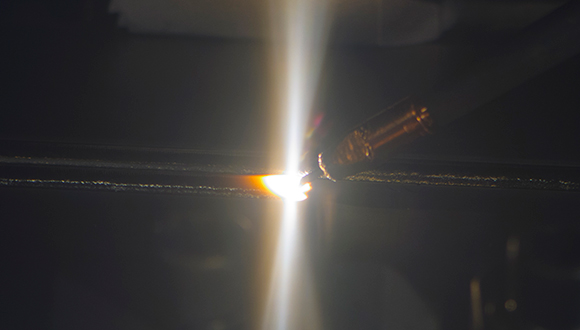Tue, 18 June, 2024
A PhD student at the National Structural Integrity Research Centre (NSIRC) is at the forefront of a groundbreaking study that has the potential to transform the future of fusion reactor development.
Tungsten, a crucial material for first wall applications in fusion reactors due to its high melting point and low sputtering yield, is the focus of an innovative new PhD project. This project seeks to advance the manufacturing process of pure tungsten using wire-fed electron beam additive manufacturing (WFEB) while harnessing the power of artificial intelligence to elevate quality assurance and efficiency to unprecedented levels.
Leading this research is Siyu Xu, an NSIRC and Lancaster University PhD student based at TWI, Cambridge. The title of the research, "Investigation Into In-line Process Monitoring for Improved Quality Assurance Using Artificial Intelligence in Wire-fed Electron Beam Additive Manufacture," underscores the ambition and impact of the project.
Compared to traditional powder bed methods, wire-fed techniques offer substantial advantages. By maintaining higher purity throughout production and handling, thus minimizing oxidation risks, wire feedstocks present a revolutionary approach. Furthermore, this technology enables better material utilization, leading to denser structures with lower porosity, improved mechanical properties, and enhanced material uniformity.
The objective of this research is to explore the feasibility of manufacturing pure tungsten using WFEB. The project will involve the development and implementation of cutting-edge machine learning and advanced techniques to optimize the manufacturing process, ensuring unrivalled efficiency and superior quality.
 Wire-fed electron beam additive manufacturing (WFEB) Photo: TWI Ltd
Wire-fed electron beam additive manufacturing (WFEB) Photo: TWI Ltd
A key focus is the refining of WFEB techniques to fabricate pure tungsten components with high density, minimal porosity, and optimal mechanical properties. By implementing AI-driven in-line process monitoring, the research aims to automate quality assurance, maintaining consistent beam quality and build performance.
Pivotal to this research is the utilization of machine learning algorithms to modify and enhance the manufacturing process, with the goal of improving efficiency, reducing waste, and ensuring the reproducibility of high-quality tungsten parts.
By leveraging AI for in-process monitoring and quality assurance, this research seeks to overcome current challenges in tungsten fabrication and establish a reliable and efficient method for producing high-purity tungsten components. Ultimately, this study is poised to drive innovation and efficiency in advanced manufacturing processes, contributing to the broader adoption of additive manufacturing technologies in critical applications.
The implications of this research are far-reaching, with the potential to reshape the landscape of fusion reactor development and pave the way for a new era of advanced manufacturing processes. As the project unfolds, the collaboration between NSIRC, TWI Cambridge, and Lancaster University promises to deliver groundbreaking outcomes that will propel the industry forward into the future.
For more information about this research, email enquiries@nsirc.co.uk